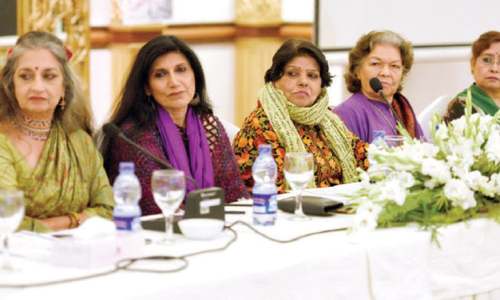
THE increasing prevalence of social media in our lives has made it a useful aggregate of societal attitudes on various issues, albeit only of those who have access to the internet. Nonetheless, following several brave women’s revelations of Hollywood mogul Harvey Weinstein, millions worldwide are now taking to social media — using the #MeToo and #TimesUp hashtags — to break their silence on sexual harassment and abuse in public, private and work places.
This platform has provided somewhat of a safe space for women to share their testimonies, inspiring others to do the same. Several Pakistani women have also spoken out. Such ‘silence breakers’ have received unparalleled solidarity — and astonishing backlash. There are several explanations for it.
Foremost is a conservative interpretation of gender roles that prefers women to stay at home; one who doesn’t is considered of ‘bad’ character. This is evident in the outrage over the Aurat March in Karachi, and even in statements by many male politicians about female colleagues and political workers. While religion is often cited to restrict women, this ignores the many strong, independent women in Islamic history who were successful in business and leadership.
There is never any justification for non-consensual behaviour or contact, but women are still blamed — deemed to be ‘asking for it’ — by virtue of the clothes they wear, ignoring accounts of fully-covered women also being harassed. Another common retort is that women who speak out are doing so for ‘attention’ or ‘publicity’, especially in high-profile cases. Besides protecting the accused, this argument ignores the threats and backlash the accusers have to face.
Women using social media to speak up have received unparalleled solidarity — and astonishing backlash.
It is highly concerning that the onus of protection from violence continues to be laid on the victims, their clothing, and their mobility, rather than on the perpetrators of harassment and violence against women.
Laws
The Protection Against Harassment of Women at the Workplace Act, 2010, defines sexual harassment as “any unwelcome sexual advance, request for sexual favours or other verbal or written communication or physical conduct of a sexual nature or sexually demeaning attitudes, causing interference with work performance or creating an intimidating, hostile or offensive work environment, or the attempt to punish the complainant for refusal to comply to such a request or is made a condition for employment”. It requires every organisation to prominently display the code of conduct in the workplace, and mandates an internal inquiry committee comprising at least one woman (from outside the organisation if there are no women employees). Complainants can address grievances to their organisation’s committee, or directly to the offices of the provincial or federal ombudspersons established under the law.
Meanwhile, Section 509 of the Pakistan Penal Code makes sexual harassment in public spaces a crime.
The Prevention of Electronic Crimes Act, 2016, also has provisions to protect against online harassment. Section 21 makes “offences against modesty of a natural person or minor” punishable, including tampering with and distributing photographs of someone. Section 24 makes cyberstalking punishable by law, including harassment, repeated attempts to contact despite clear disinterest, monitoring, spying, or taking photos of someone with the intent of harm.
Cases
The statistics of women who have faced harassment are striking, but the real number is much higher as the incidence of reportage is very low, for several reasons.
First, sexual harassment takes place when the perpetrator abuses his position of power to take advantage of the victim’s vulnerable situation as a subordinate. This risk of social stigma and losing one’s job discourages survivors from speaking up. Even in cases where harassment is legally established, women face a hostile environment that is difficult to cope with, which leads many to resign.
Second, harassers benefit from the privilege of being male in a patriarchal society, where the word of a man counts for a lot more than a woman’s. This is evident in the struggle of Pakistani women against the law of evidence, which considers the testimony of one man equal to that of two women.
Third, few legal precedents exist because of new laws with lacunae, and a patriarchal judicial system where even the judiciary has been known to make misogynistic remarks. In a sexual harassment case at the PTV, the complainant had to quit her job, and although the MD, the alleged perpetrator, was later terminated, the official reason was not the complaint against him. The Punjab ombudsperson found an accused guilty of harassment, but could not overturn the survivor’s termination of employment. There is a need for strong precedents to be set, such as in the case of Patari’s former CEO, to give confidence to other survivors to come forward.
Further, the practice of scrutinising character in order to establish harassment is highly problematic given the subjective moral yardsticks in a deeply conservative society where gender roles are as rigid as the insistence on material evidence. Hence, testimonies, especially multiple in numbers, need to be given more weightage.
The recent spate of allegations at educational institutes in Karachi and Islamabad show the younger generation using the empowerment that social media offers to speak up and work in solidarity. This has raised the need for comprehensive codes of conduct and laws to govern harassment among students, and to set procedures to address such cases.
The #MeToo and #TimesUp movements on social media are increments to the struggle of women, over time, to reform social attitudes that perpetuate misogyny and abuse. Power structures are being disrupted, and arguments of culture are bound to come up, but these movements are essential for a society where women can feel as safe as men in private and public spheres — because the time is up on harassment regardless.
The writer is director of Bolo Bhi, an advocacy forum for digital rights.
Twitter: @UsamaKhilji
Published in Dawn, May 25th, 2018














































